You can follow the industry’s immediate response to Covid-19 in our first Covid-19 Hub here and then all the initiatives and actions taken in April in our second Covid-19 Hub and then our third covering events in May by clicking here.
The Buyer’s Covid-19 rolling hub has been selected as one of the best in the country amongst specialist business media by the UK Press Gazette, the industry bible for journalists, in its Coronavirus Excellence Journalism initiative.
June 5
Michael Saunders on how Bibendum has adapted during Covid-19 – and his hopes for an on-trade revival
Michael Saunders, chief executive officer at Bibendum, shared his – and the company’s – experiences throughout the Covid-19 lockdown with Richard Siddle in an extensive interview for VINEX, the global online trading site for bulk and bottled wine, this week.
In it he explains how it has been able to keep trading thanks to a multi-channel business model that, although, heavily reliant on the on-trade, also enjoys good business with the major multiples through the grocery side of the company and the independent and specialist retail sectors through its separate division, Walker & Wodehouse. Its a model it has had since the 1980’s and one he is particularly pleased to have when the majority of its on-trade customers are closed.
As well as doing what it can for any on-trade business it can help, Saunders (5 minutes of recording) is also quick to talk about its responsibilities towards its producers from all over the world that are having to endure loss of sales in all their key markets around the world.
“I believe relationships are incredibly important both ways – from to my customers, but from us to our suppliers as well, and it’s not just business, they are families and that’s how I like Bibendum to be considered,” he says. “Whatever we can do to help them we are trying to do.”
He also talks about the security that C&C’s ownership of Bibendum gives the business in times like this (seven minutes) and that it makes him “feel like sitting on a ship in a calm port” compared to the “raging seas” that some of “his peers” might find themselves.
Working with independents
Saunders (nine minutes) also assesses how it has looked to adapt its range of wines to independents so that it is providing them with the right types of wine at this time, ensuring they have a wider range to choose from, switching where possible some of the agency wines that previously were aimed at the on-trade. He also stresses the businesses did not even think twice about going direct to consumer and was keen to be there to “support” independent merchants rather than, in any way, “compete with them”.
He hopes this will prove to be a pivotal time for the independent sector and that many of the consumers who have turned to independents and online during Covid-19 will continue to shop in that way in the future. It would be “incredibly healthy for our industry long term” if they do, and build on the success we have seen across the country with independents doing online tastings with producers and selling wine on the back of them.

Heath Ball and the Red Lion & Sun were one of the first pubs in London to latch on to the idea of offering its customers good quality food and wine for takeaway and collection
Saunders was also able to talk through the Local app (16 minutes) that C&C has developed for all its businesses to help pubs, restaurants and retailers promote what they are doing in terms of delivery and collections. An app that can also be used for contactless payments and ordering for when the on-trade does comes back. He singles (15 minutes) out the innovations that Heath Ball, owner of Red Lion & Sun, has introduced through his pub in Highgate to offer great quality wines and food to local customer, through Local, for takeaway and collection.
How about the future?
He also looks into the future and what sort of industry we can expect months down the line (20 minutes) and how different on-trade operators are going to be able to work and what future trade tastings might look like. That’s where much of Bibendum’s work now is around looking at what solutions and help it can provide its on-trade customers when they do re-open.
“We’re trying to think about what our customers need, as it’s not necessarily going to what they needed before,” he adds. “We are having to think about potential solutions and then work through it in a customised way for all our clients…we may be able to be innovative and radical – and that’s quite exciting.”
Saunders also says there is an opportunity for the on-trade to build on the success of online “and sell more expensive, boutiquey wine at less brutal margins” (22 minutes) where the emphasis is on delivering “cash profit to the business”.
Adrenaline flowing

Saunders and his team are also now looking at what added value solutions they can offer their on-trade customers when they return
Although the last three months have been very tough on the on-trade, and its suppliers, he believes this is also a time to get the “adrenaline flowing” again” and be positive about what could lie ahead when pubs and restaurants are able to “re-launch” themselves (24 minutes). “What change we can do to make it better going forward and not just the immediate term, but the medium to long term as well,” he adds.
He says he may be a born optimist, but he also does not expect “to get very large scale business back until 2021 – it’s going to be a slow run in – but it all depends on the social distancing rules” (26 minutes). That said the new trading rules might also open the way for different bars and outlets to appear that we have not seen before.
Saunders, with his chairman of the Wine & Spirit Trade Association hat on (30 minutes), looks at the impending Brexit date at the end of the year and makes a clarion call for the global wine industry and producers around the world to keep the faith with the UK wine industry as it will with them. “Don’t forget the UK when we come out of all this. We are open for business and love great wines and love working with people all around the world.
He finishes by saying how impressed and rewarded he has felt by the “sense of community” he has seen right across the drinks and hospitality industries during this time, none more so than within the Bibendum “community” itself. “I have been delighted, amazed, proud, of the way that my team have pulled together, be they working or on furlough, to help each other…the lesson is not to take any of that for granted.”
People’s Choice Wine Awards launches an industry advisory panel

With so many wine competitions it can be hard to find a real point of difference between them, particularly when it comes to its impact during the rest of the year when the event is not active. The People’s Choice Wine Awards has always done things differently – by involving the average wine drinker in the judging for start.
It has now pulled together what it is calling its Trade Advisory Panel (TAP) that the rest of the wine industry can potentially call on to help them when planning and putting together new research projects and ideas of their own. A group of professionals from different backgrounds and sectors of the wine industry that are all willing to give up their time to help others push on with plans of their own. Experts, if you like, that are on TAP to help.
Janet Harrison, founder of PCWA, says the panel’s expertise covers everything from importing wine, packaging, buying, the on and off-trade sectors, and producing wine (see the above image for panel members).
Judy Kendrick, co-director of PCWA, says a research project might include asking panel members to help advise on packaging concepts, design, formats, “the taste of ‘the juice’ and much more”.
She explains: “In these busy times, it is practically impossible to gather such a prestigious group of industry experts ‘in one room’, however, online conferencing facilities has made this much more achievable.”.
They believe the TAP project has the potential to really fit into our new working lives, where so much of us are working from home and potentially have more time and flexibility to take part in these sort of initiatives. Harrison says the panel is “actively looking for new and exciting projects to work on”.
If you would like to discuss any ideas in more detail then email her on janet@peopleschoicewineawards.com.
Brandwatch: how our drinking habits have changed during lockdown
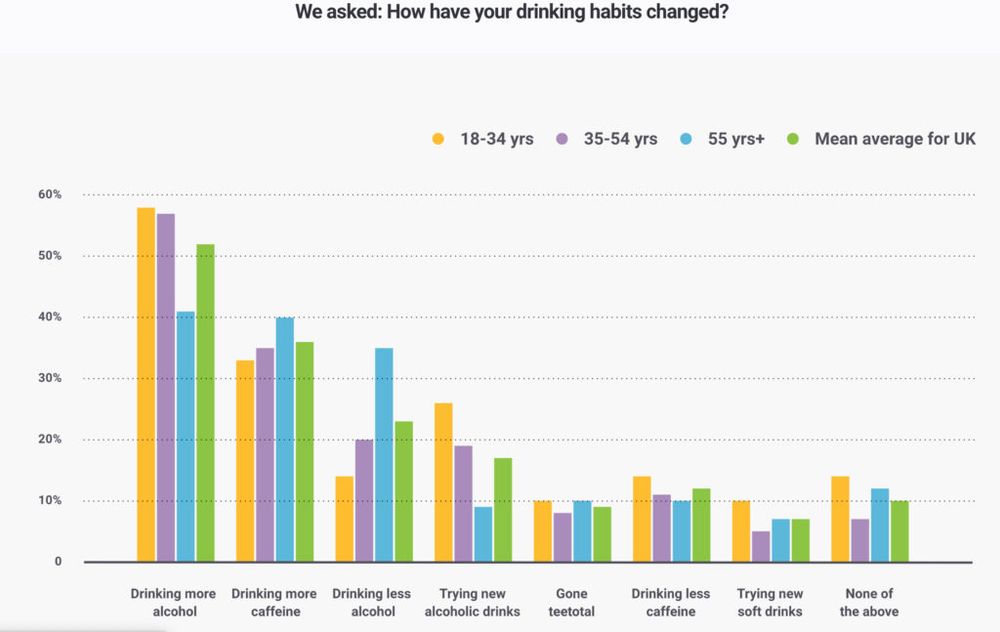
New research from Brandwatch shows that just over half of UK consumers it surveyed are drinking more alcohol since lockdown began, while around one in 10 have gone teetotal. Other trends show that a third of people over 55 are drinking less, and there is more interest in alternative drinks, like caffeinated beverages. Even before lockdown began, says Brandwatch, there was evidence that UK consumers were looking more at craft and premium soft drinks and artisanal alcoholic drinks. This has continued in lockdown, with people willing to experiment with other alcoholic and non-alcoholic drinks, particularly in the 18-34 age group.
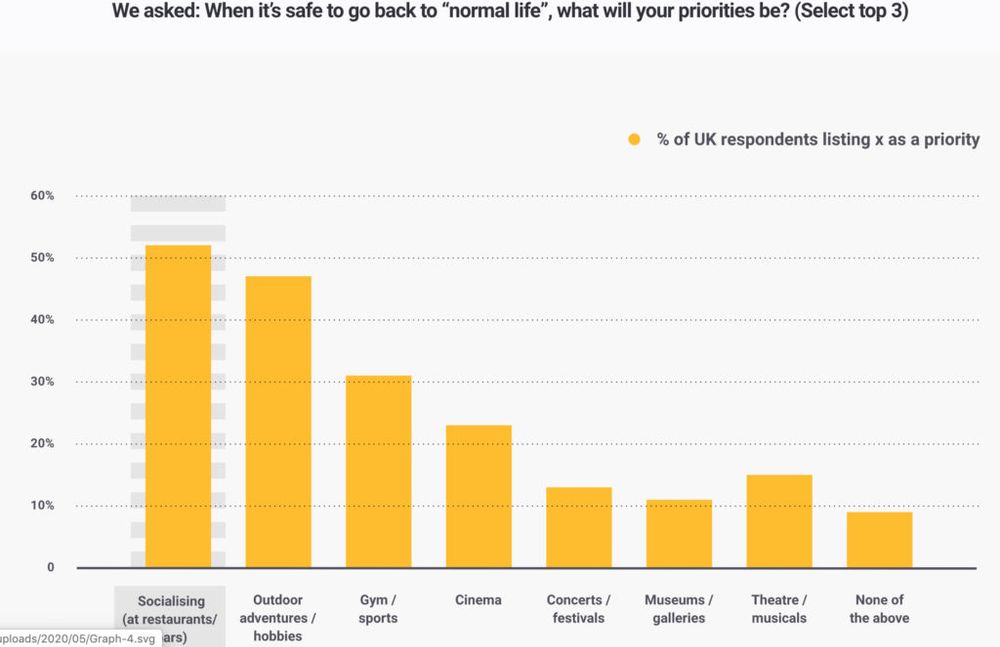
Even with the lockdown slowly easing in the UK, 62% of people felt it would take longer than six months for society to get back to some semblance of “normality”. But the good news for the on-trade is that when it does going out to restaurants and bars to meet friends is the highest on their to do list (52%). Going out for food or sharing food and drink at home with loved ones is the second most-missed activity after human contact in general.
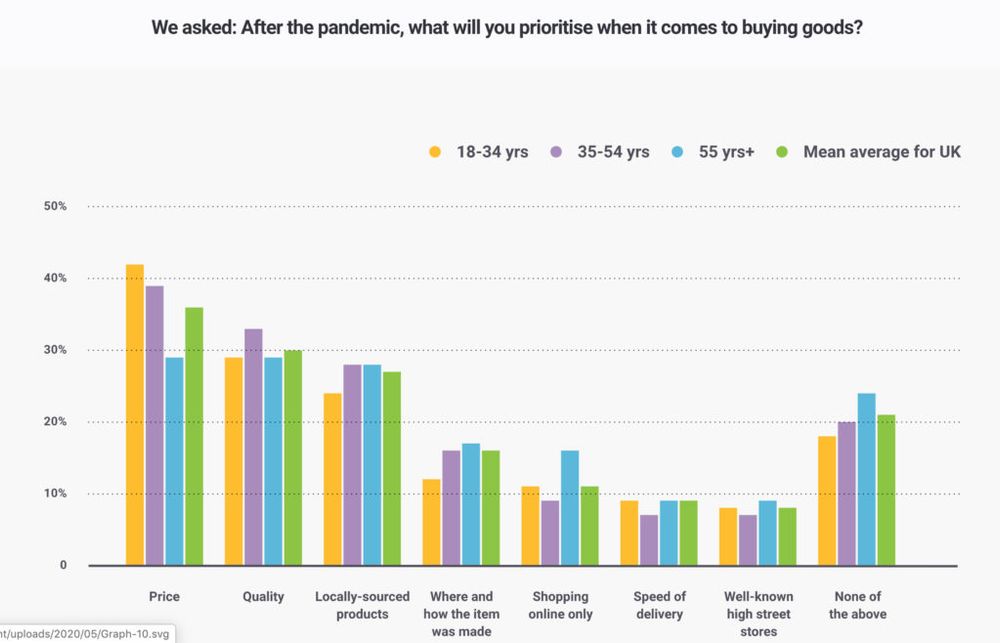
Over a third of those surveyed (36%) said “price” would be the most important factor in deciding what to buy post-lockdown, closely followed by “quality” (30%), then “locally sourced” (27%).
Wines of Great Britain to use online tastings and events to promote English Wine Week
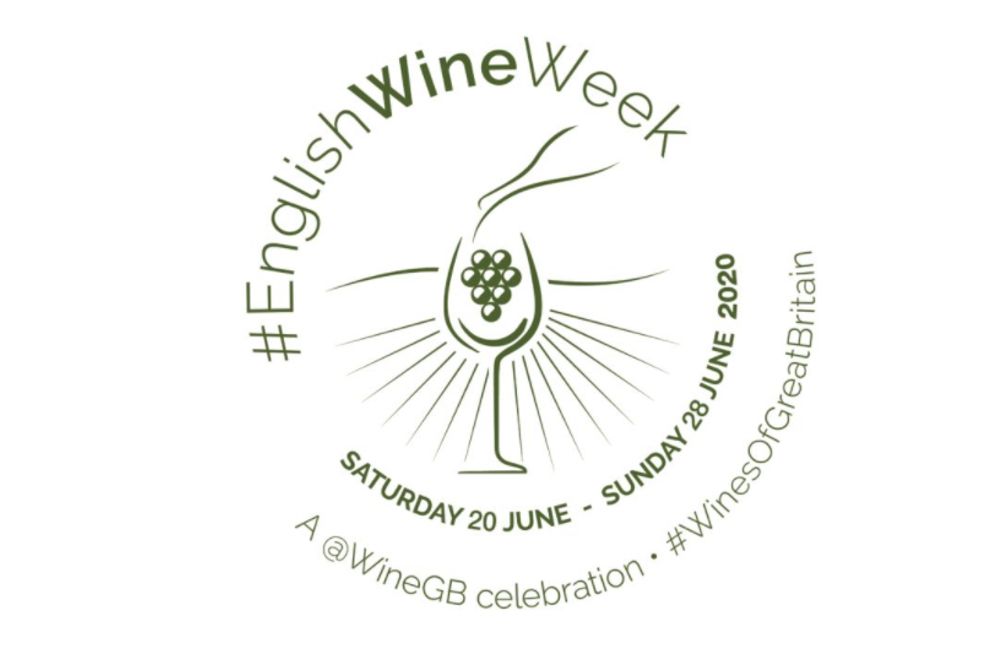
Wines of Great Britain is taking its English Wine Week online between June 20 to June 28 in order for as many retailers, restaurants and members of the wine trade can get involved as possible. To help businesses take part Wine GB has produced a range of digital assets that can use either to run tastings, or promotions online or in store. It has also pulled together a toolkit of ideas to give people some inspiration to help them celebrate all things English and wine during the week.
A number of wineries have already announced they will be running virtual tours and tastings, and teaming up with local retailers to offer their wines on special deals and offers.
Julia Trustram Eve, marketing manager of WineGB said: “We’ve seen a huge amount of resourcefulness and creativity amongst both our members and the wine trade over the last few months, and we are keen to harness this to further support our industry during English Wine Week.Our #EnglishWineNights across social media have been a huge success, and we want to build on this increased awareness and goodwill for English wine producers by shining a light on them during English Wine Week.”
It’s a good week to be waving the English flag as it also coincides with the Summer Solstice, Midsummer’s Day, Father’s Day and what would have been Glastonbury weekend.
To find out how you can get involved visit the English Wine Week website here.
June 3
CGA: on-trade is ready to re-open
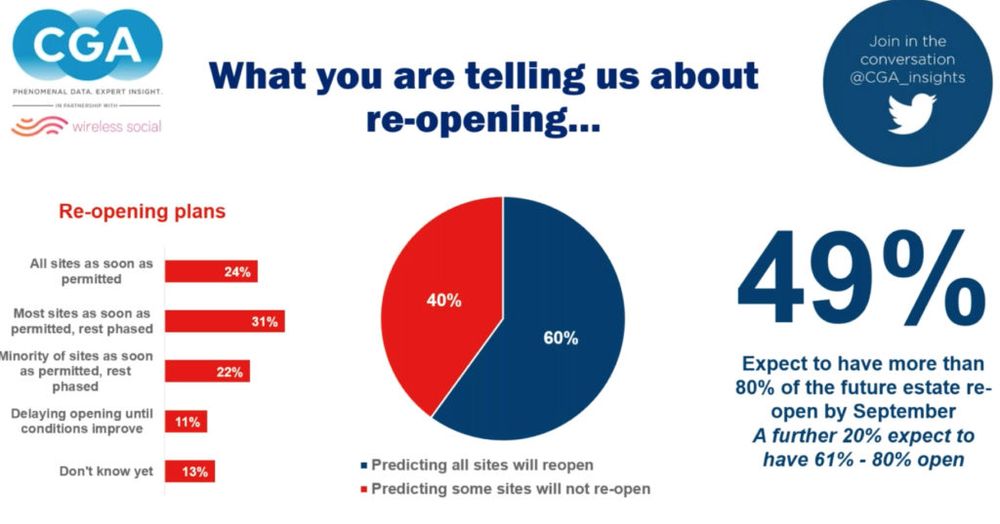
CGA has also released data that shows how much of the on-trade is ready and waiting to come out of lockdown when it can on July 4 – the date the government has set for when pubs and restaurants can re-open.
CGA has also backed up CYT UK’s data with evidence that shows wine is the least affected of all drinks categories in terms of what people choose to drink at home and in the on-trade, whereas cask ales and cocktails have dropped off.
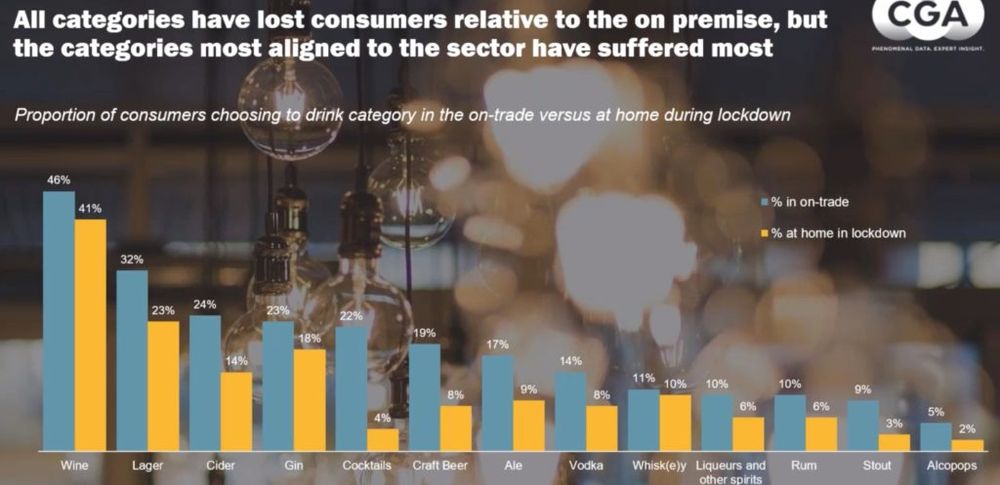
Here’s a breakdown of what drinks people have been drinking in lockdown
It is interesting to see what people have been doing in lockdown with a big swing towards entertaining themselves online with video chats and quizzes. Again backing up CYT UK analysis that people are looking to cook more at home and use ingredients from restaurants and recipe kit companies.
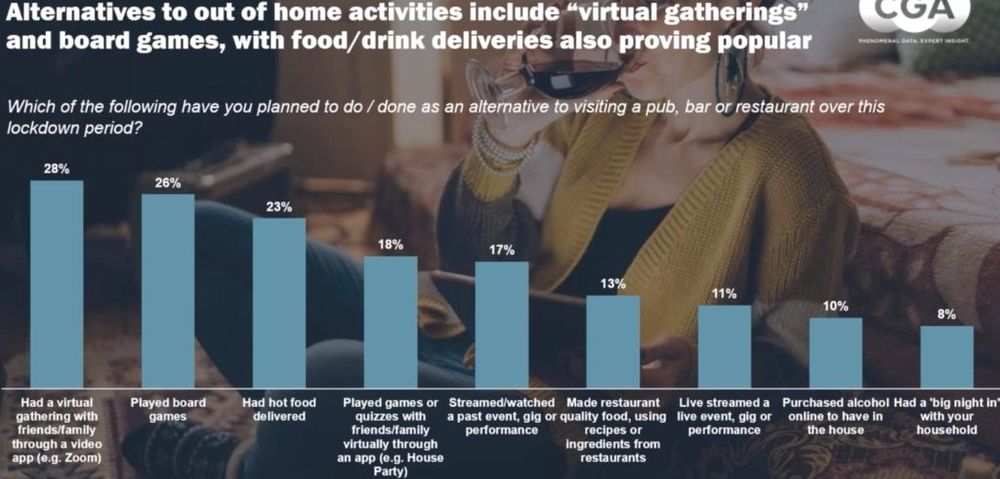
What activities are people enjoying during lockdown
We know behaviours are changing but which ones will stick post Covid-19? It seems living more of our social life on apps and on video conferencing platforms is going to be the norm. And how people will be keen to enjoy the restaurant experience but more at home, so a big challenge and opportunity for operators and drinks brands to think how that can work for them.
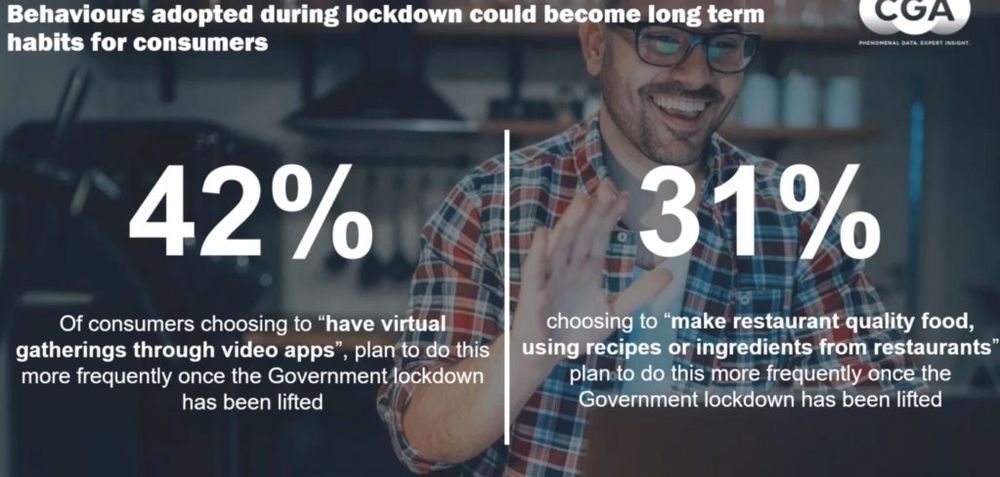
What changes in behaviour will stick post Covid-19
As the on-trade re-opens here is an indication of the key measures that consumers would want to see in place before they are comfortable returning.
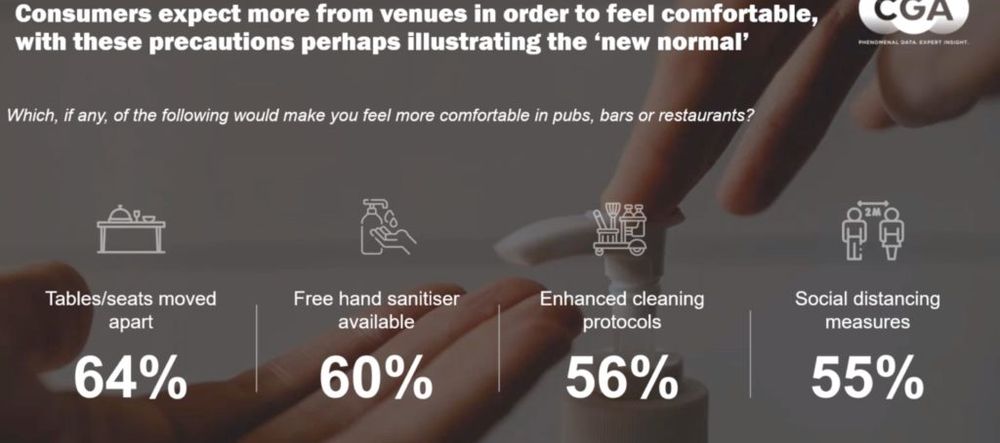
CGA has also identified four key trends that are likely to drive how fast the on-trade can recover and that despite the willingness of operators to re-open, the chances are it is going to be slow and mixed depending on different parts of the country and what sort of outlet you run.
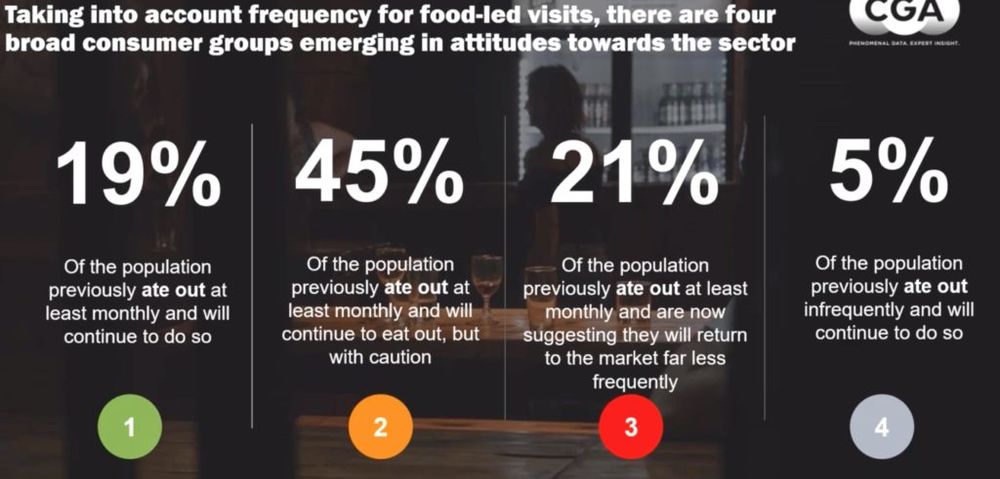
NB: Look out tomorrow for the release of CGA and The Buyer’s second Covid-19 Bulletin analysing consumer trends during lockdown and what steps different drinks and on-trade operators are taking. Your personal copy will be emailed in the morning if you are signed up to our mailing list here.
Concha y Toro UK on how wine has lead the way in the off-trade during lockdown
Interesting data has been released by Concha y Toro UK this week that shows just how well beers, wines and spirits sales have been in the off-trade during the lockdown. But they have needed to be as the impact of a closed on-trade has meant that only wine has not really lost out when you look at the overall impact and the cumulative effect of a strong off-trade and never zero sales in the on-trade.
The chart below shows that wine has been able to hold on to 95% of its usual sales thanks to the massive upsurge there has been in the off-trade and through online sales. Beers, cider and spirits have faired less well with beer relying on half its volumes from the on-trade, compared to 14.8% for wine.
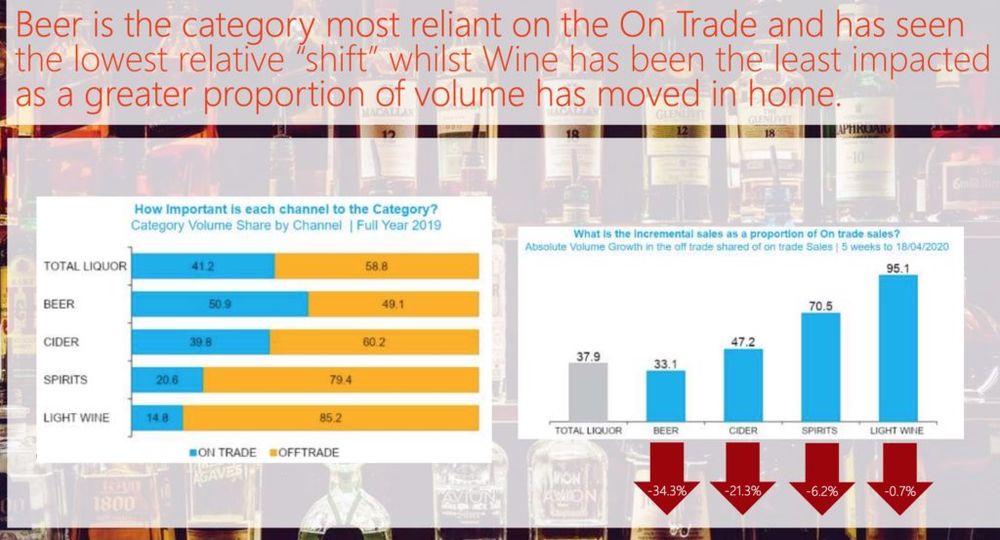
Overall sales of beers, wines and spirits have been up 24% for the 12 weeks to May 16 (Nielsen). Of which beer and cider sales are up 34%, wine and spirits is 22%, RTDs up 20%, with sparkling and Champagne down 5%. CYT claims it is trading ahead of the market with 34.3% increase in sales, which demonstrates consumers desire to back big, reliable and well trusted brands. What is particularly encouraging is that the sales momentum is being kept up with total wine sales up 31.8% in the last four weeks and CYT up 40.8%.
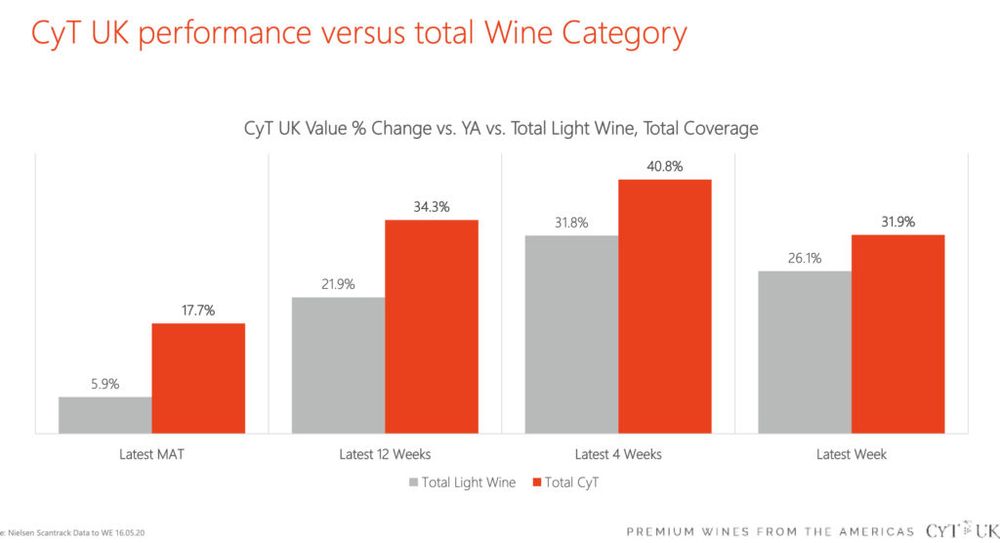
The CYT figures also revealed just how well online and convenience sales have been during lockdown. Online is now worth 12% of the grocery market, compared to 7.5% in 2019, driven by a large increase in new shoppers using online and delivery services for the first time.
Interestingly the surge in online spending could have been even higher, says CYT, with 40% of consumers saying they were unable to buy online due to a lack of delivery slots. That said one in five shoppers shopped online in April.
CYT expects shoppers to continue to shop less, but when they do spend more on bigger basket spends. They will not, for example, be at the 2019 levels where the average consumer shopped 266 times in the year, at around five times a week.
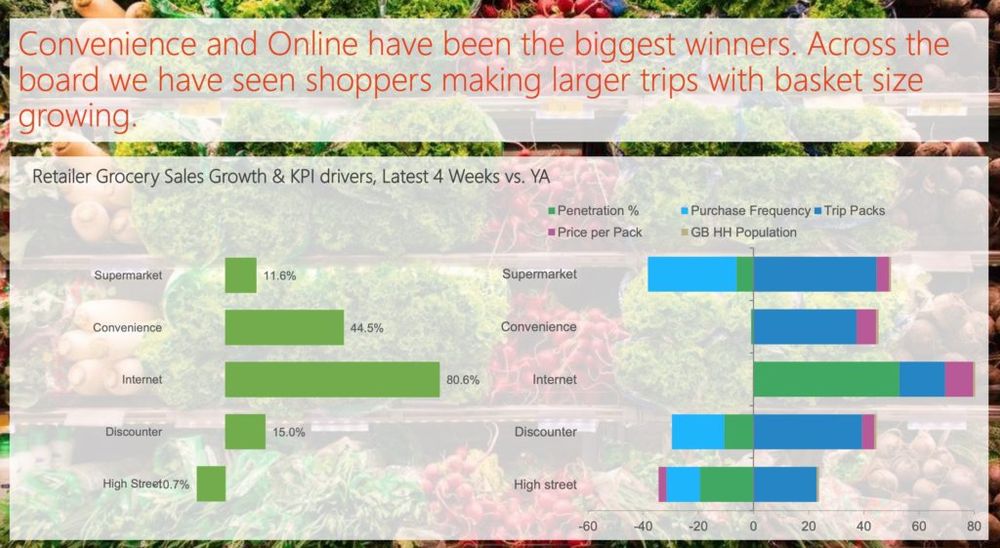
CYT says the key for major brands at this time, not just in wine but across all grocery categories, is to continue with investment, particularly in marketing and advertising.
“Don’t go dark” is one of its key messages, and the businesses that keep innovating and pushing new product development that is focused on what benefits a particular brand can bring to its targets consumer are the ones that are most likely to come out of this stronger in the long term. Brands that do invest in a recession can grow nine time faster than in normal times, according to Kantar, says CYT.
Push back on discounts
Another key trend that has emerged over the last 12 weeks is that the heavy discounting, that has for so long been the main calling card of the major grocers, may not be necessary in the long run. Wine sales have boomed at at time when there has been little or no discounting of major brands at all. The consumer demand has been so high there has been no reason to promote or cut prices.
CYT is hopeful this can be maintained when the wine market gets back to normal as it can help drive much needed value back into the overall wine category. It says there had already been a decline in the volume of wines being sold on discount – down to 33% pre Covid-19 from 55% last year. CTY said it “would be surprised” if discounts went back to pre-Covid levels for the rest of 2020 and into 2021 as well.
The CYT analysis also looked at consumer morale and confidence levels and how they have changed over the last three months. It’s clear financial worries have become a bigger concern than health as the number of Covid-19 cases and deaths decline. Research shows that 70% of people have suffered financially during Covid-19 or expect to be in the future. Only a third have been unaffected. Which with 8.4m people also on furlough could become a higher percentage in the weeks and months ahead when people come off the scheme.
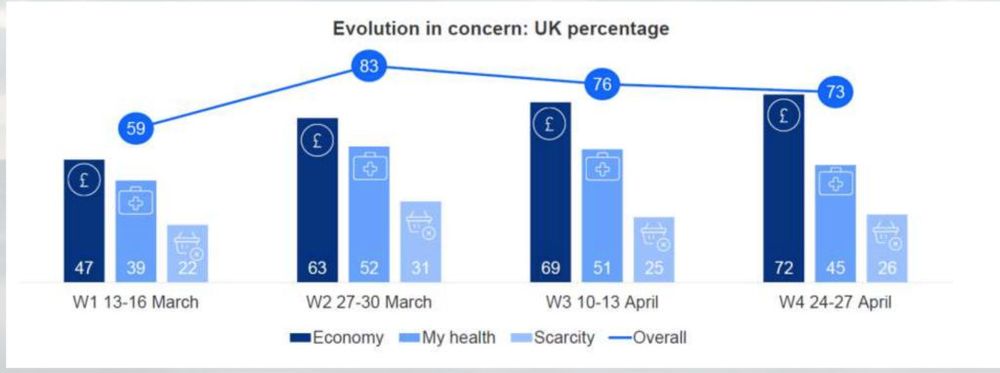
CYT also pointed to economic forecasts that could see a 35% drop in in GDP in the second quarter of the year – a decline not seen since the First World War.
Other key points:
- It might take longer for the on-trade to convince consumers it is safe to go back to bars and restaurants with 63% of consumers ‘uncomfortable’ about going out post Covid-19 (YouGov).
- Younger wine consumers are coming into the off-trade that usually only drink wine in the on-trade, so opportunity to capitalise on these new drinkers for brands and retailers.
- Note these younger wine drinkers are not comparing wines with wines, but looking at prices, and value versus other alternative drink choices.
- Challenge for wine and drinks industry is to how it first looks to replace what were 100m drinking occasions in the on-trade in Q2 and Q3 in 2019 but finds new occasions where wine can be relevant.
- There is an opportunity to promote and position wine around new occasions like online video chats, zoom quiz nights and more at home options.
- How can wine help restaurants offer more at home experiences.
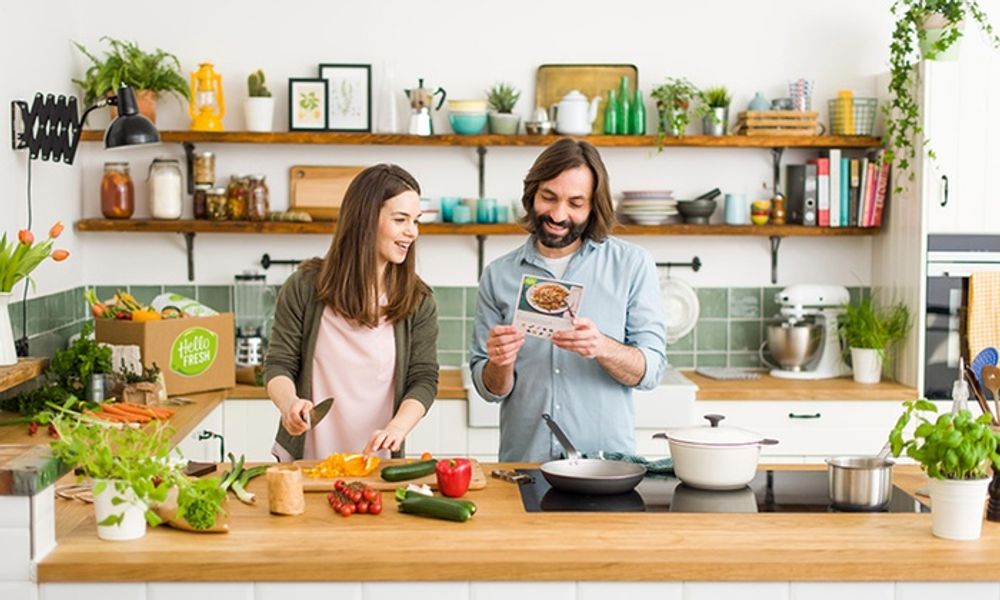
The success of new subscription food recipe home delivery meal kits like Hello Fresh are becoming a serious worry to supermarkets and how people shop
- Is there a role for wine in the increase in demand for meal kit and recipe kit companies like Hello Fresh and cooking from fresh at home – 43% of people say they are buying ingredients to cook for the first time.
- Need for wine to appeal to an even more conscious consumer be it about themselves, health, the planet and the environment – 92% of consumer want to hear from brands and what they are doing.
- 64% of consumers will judge brands now on how they treat them in future.
June 1
Quintessential Brands picks the supercharged changes in consumer behaviour
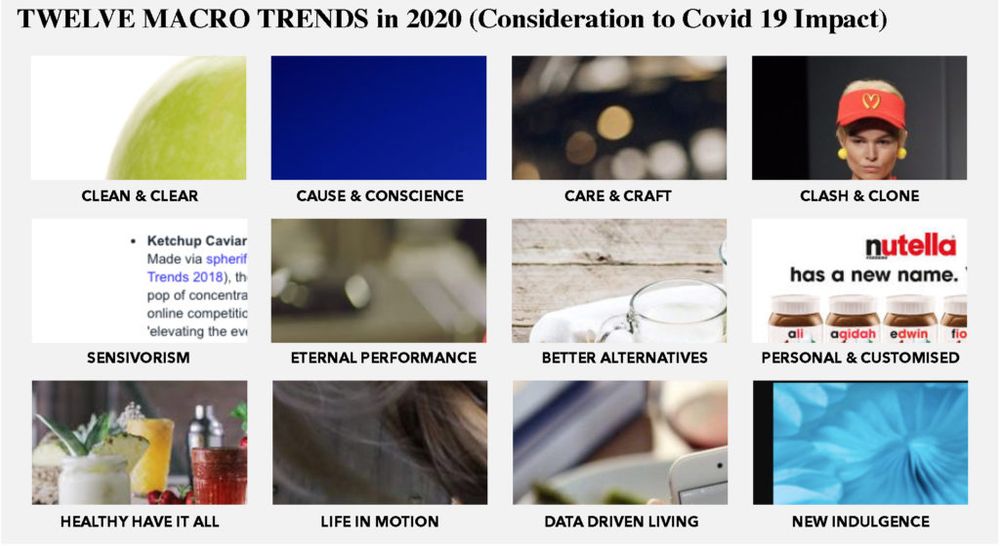
These are the 12 changes in consumer behaviour we need to address says Quintessential Brands and Dragon Rouge
Quintessential Brands, the leading spirits brands group, has been working with creative agency, Dragon Rouge, to look at how the Covid-19 crisis has already changed consumer behaviour – potentially for good. Dragon Rouge has identified 12 of what it sees as the overall macro trends that were already having an influence on consumers going into the crisis.
Neil Anderson, retailer brand marketing director for Quintessential Brands, picks out the main trends he believes will have the most impact on the drinks, retail and hospitality sectors. As he explains: “There will be changes to consumer attitudes and behaviour coming out of lockdown. It’s just recognising what are key ones that will potentially impact purchasing and consumption behaviour.
“Out of these 12 Emerging Trends identified for 2020 from the agency, Dragon Rouge, it’s interesting to identify the five key ones likely to be supercharged due to the Covid-19 impact on our lives. These are already supported by the changing shopper, and the consumer and purchase dynamics we are already seeing happening.”
Clean and clear: this the desire for the simple, clean and traceable products. Telling me what’s in it straight is now more of a consumer expectation than ever – it’s about the need for the authentic, the simply made (un-processed or messed about with) and the need for reassurance on ethics and integrity.
Cause & conscience: This is going to be the era of brands not just saying but doing what they mean – not just platitudes, but real action. Linked to the desire to buy into brands with more purpose and care behind them, there’s more and more expectation that brands are open about their values and causes and back it up with real proof.
Better alternatives: Now ‘alternative’ isn’t that mainstream, it’s about alternatives to categories that are made better, taste better and do better. This is now the expectation.
Healthy have it all: Now we expect brands to help us manage both our health and our sins – having our cake and eat it. It’s a need to make the once less-permissible more permissible to benefit health and to bring happiness without the guilt.
New indulgence: We are going to see people with some “new found freedom” coming out of lockdown. A desire for more exciting tastes, formats, novelty, being part of an experience. I deserve it. I will pay more for the experience.
South Africa wine lockdown ends as domestic sales are allowed from June 1
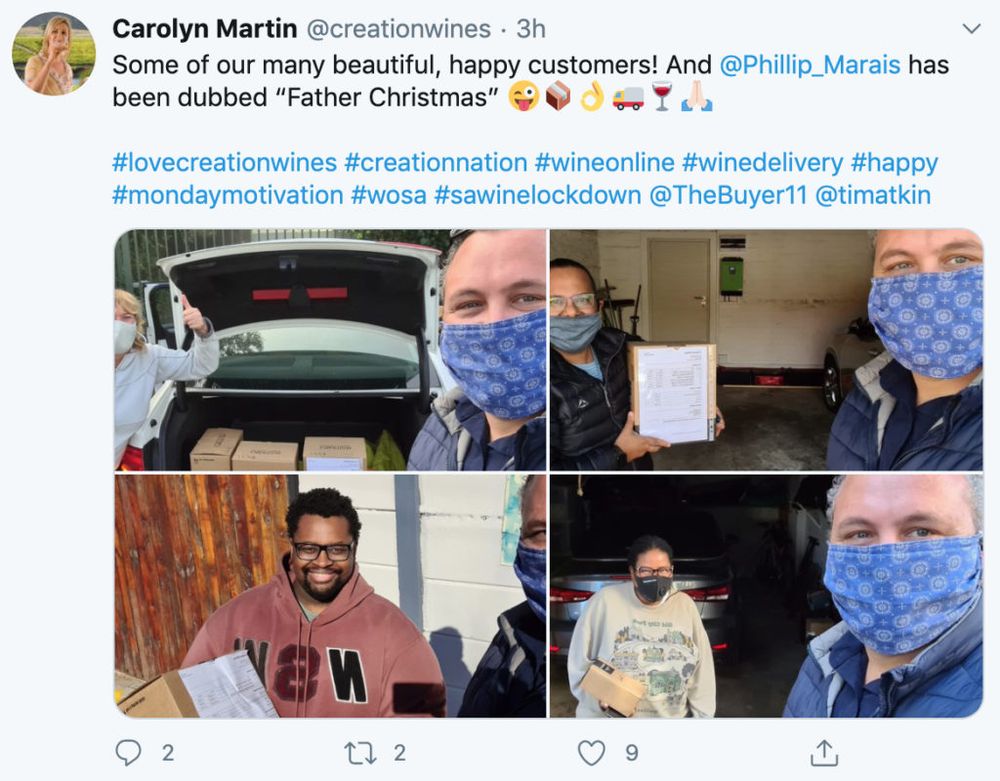
Carolyn Martin of Creation Wines encapsulates the excitement but also the relief that wine sales are once again allowed in South Africa
The South African wine industry is back and open for business as June 1 marks the first day since the country’s official lockdown that producers and retailers can now sell wine domestically. Whilst the ban on exports was lifted last month, the industry has had to endure weeks of no sales at home since the country went into national lockdown since March 15.
Whilst today is clearly good news for the country’s wine industry and all the services and businesses it supports, the impact of the lockdown has already been devastating with hundreds of jobs and businesses lost. Vinpro, the trade body that represent growers and producers and has done so much to lead the industry’s lobbying calls to the government, has announced today that it believes about 80 wineries and 350 producers have gone out of business, and overall 18,000 workers have lost their jobs.
Vinpro says the industry lost a combination of R200 million per week through exports over the lockdown period, and R300m as a result of not being able to move or sell wine domestically. The scale of the losses could be as high as R3 billion.
The relaxation on wine sales comes as the country moves to its level 3 of Covid-19 conditions. It means “Liquor product sales may take place between Mondays and Thursdays, from 09h00 until 17h00, at any licenced premises; no liquor may be consumed on premises, but all licence holders may sell liquor during the designated hours; premises licenced for on-site consumption may also sell liquor in sealed containers for take-home purposes.
Torres cuts carbon emissions by 30% and ahead of schedule

Torres winery in Penedes along with electronic train which is a feature of its environmental efforts
Familia Torres has announced it is a year ahead of schedule in being able to reduce its carbon emissions per bottle by 30%. This covers all its emissions from the vineyard and through the supply chain to the consumer. The 30% figure is based on the emissions it was giving out in 2008 and its 2019 carbon footprint inventory.
But it is not stopping there and sees this as very much the first step in tackling climate change and doing what it can to make its vineyards and production and distribution standards as environmentally friendly as possible. Its next big goal is to cut its CO2 emissions per bottle by 55% compared to 2008 levels by 2030.
Miguel A. Torres, the president of Familia Torres, says: “We made an enormous effort to reach our emissions reduction target, which we considered very ambitious at the time. Now is the moment to push for even more ambitious environmental actions to mitigate global warming and protect winegrowing from its effects.”
The news comes as the Spanish and Chilean wine business is celebrating its 150-year anniversary.
Hand santisers – with a personal touch
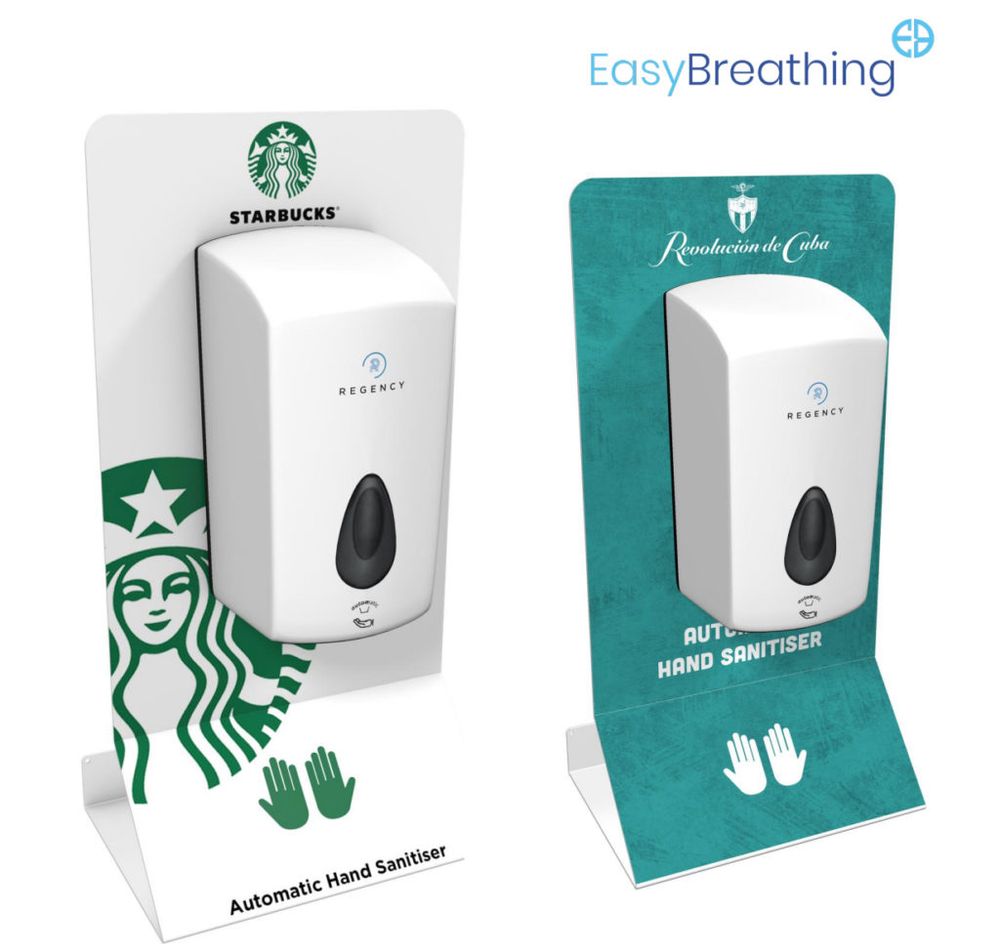
Touch free hand sanitisers are in high demand
If you want to run a successful drinks, retail or hospitality business then you will need to be as sharp about your outlet’s hygiene standards as you are the food and drink you can offer. In fact such has been the demand for hand santisers that we have seen many of the country’s most famous brewers and distillers switch production just to keep up.
Here’s an idea of how you can make being clean, safe and healthy actually part of the branding message of your business. EasyBreathing is a business in high demand at the moment as it distributes a range of masks and health protection and PPE equipment. It is also providing a range of hand santiser equipment and displays for retail and hospitality venues that you can personalise with your own branding and logos to make them feel a bit more part of the every day experience of coming to visit you. They come in a variety of units and sizes, costing from £160 plus VAT and can be branded and made up in whatever livery you like.
It is already working across a wide range of sectors and is looking for new business opportunities in the retail and hospitality sectors – particularly as it has a range of touch free, automatic machines ideal for public spaces. If you would like to find out more you can also contact a familiar name – Jamie Coles – who used to work in the drinks industry on the sales team at Harpers Wine & Spirits. Jamie can be contacted on jamie.coles@easybreathing.uk.
Drinks Trust goes live with its Wellness Services
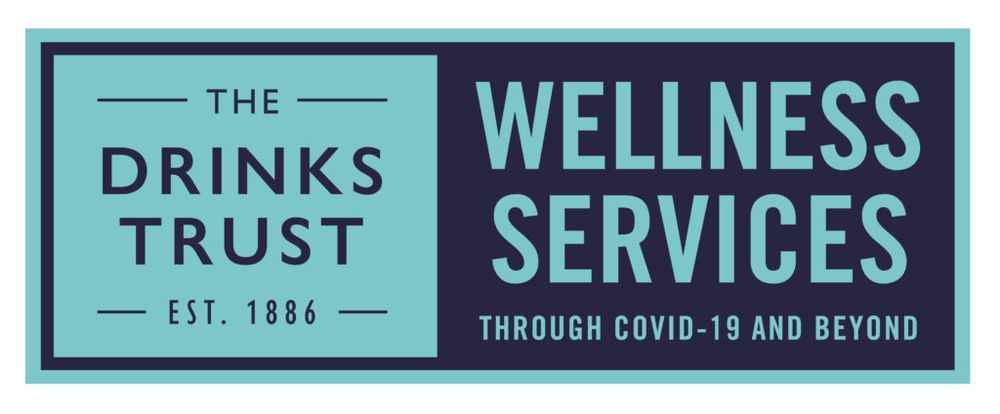
The new Wellness Services being introduced by The Drinks Trust go live today for members of the drinks and hospitality sectors to sign up to. More details on each scheme can be found on the Wellness’ website and further information will be provided as they are rolled out and members of the trade sign up to them. Here is the list to choose from:
- Wellness Guidance & Tools: expert advice from Drinks Trust’s resident wellness and leadership coach, Kat Hounsell, founding director, Everyday People.
- Complimentary Talking Therapies; telephone, text and video support.
- Sleep & Insomnia Treatment; from the UK’s leading specialists in helping people with their sleep behaviour. You can register here.
- Mindful Drinking Programme; to promote a healthy approach to consumption run by Club Soda.
May 29
UK Hospitality calls on suppliers to fill in survey to help it lobby government for support

UK Hospitality’s Kate Nicholls is looking to get drinks suppliers dedicated support from the government
UK Hospitality has launched a Supplier Alliance that it wants to use to push the government to give practical support to all the businesses that supply the on-trade that have seen their revenues dry up with all restaurants and bars closed – by order.
To establish just how bad the situation has been for drinks suppliers and what sort of support and help they need, UK Hospitality is asking companies to fill in a survey and share their experiences. It is keen to canvass and involve both suppliers who are already members of the trade body, but also non-members to get as broad a range of answers as possible.
The survey is quite wide ranging from assessing the size of the business and how established it is in terms of years of trading, what percentage of business they have lost, to the amount of money any particular company trades with different channels of the on-trade. It also asks suppliers to vote on whether they support calls for VAT deferrals and business rates relief.
Interestingly the survey looks to assess where the pressure points are within the trade itself and how difficult suppliers have found it in terms of managing and furloughing staff, through to applying for loans, to support from operators and the overall supply chain.
Kate Nicholls, chief executive of UK Hospitality says: “The effect of the COVID-19 crisis has been acutely felt by hospitality businesses, and the impact is felt right across the sector. There are many associated businesses which rely on the sector for their livelihood and these have been hammered just as hard.
“Supplier businesses within hospitality are just as wide-ranging, varied and dynamic as the venues themselves. Our sector supports businesses as disparate as EPOS companies, licensing solicitors or even linen specialists. The shutdown of the hospitality sector has meant that all these businesses have been forced into hibernation as well.
“The government has recognised the damage that pubs, restaurants, hotels, bars and nightclubs have suffered and have acted quickly and decisively to provide support and save jobs. There are many businesses integral to the hospitality sector, facing the same existential crisis and they need the Government’s support now.”
If you want to help and share you experiences then click and fill out the survey here.
Chart of the day 1: Rise in wine sales being driven by private label (Kantar and Quintessential Brands)
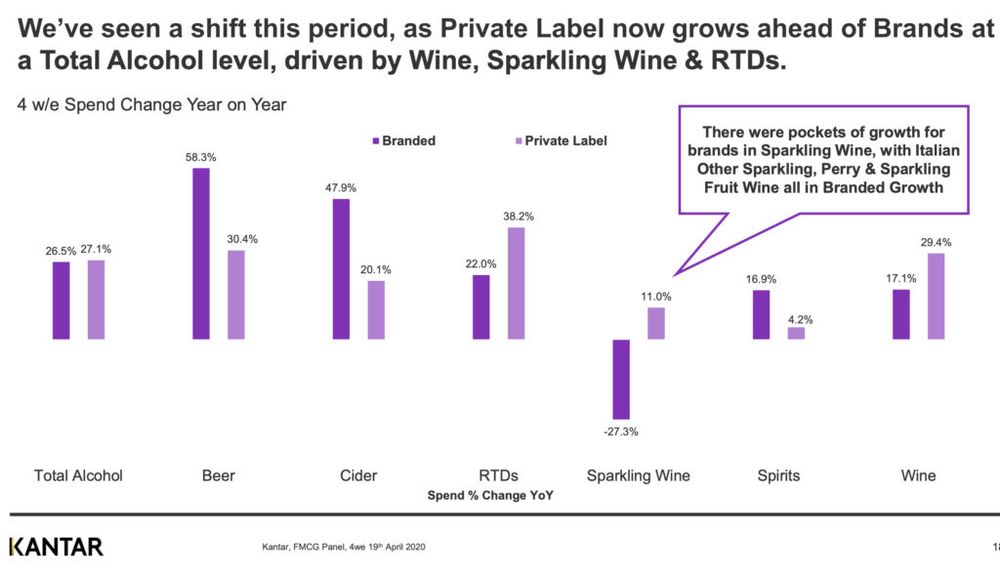
With no promotions to entice shoppers to switch between brands they are sticking with private label
Today’s Kantar chat from Quintessential Brands shows how important private label sales have been during this crisis for wine. But not for beers and spirits where brands are so strong. These figures for four weeks in April shows dramatic rise in private label sales compared to branded in wine. This would echo store reports from analysts that consumers simply do not have the time to be walking up and down the wine aisle perusing what to buy. They need to make decisions fast, which means going for the tried and familiar. In wine, for example, there has been a 29% increase in private label sales versus 17% for brands.
Whereas in beer it is the power and familiarity of the big brands that is really winning the argument there with a 58% increase in branded sales against 30% for private label. Similarly in spirits brand sales are up 16% compared to 4% for private label.
Chart of the day 2 : Google searches for booze, cocktail and beer delivery zoom
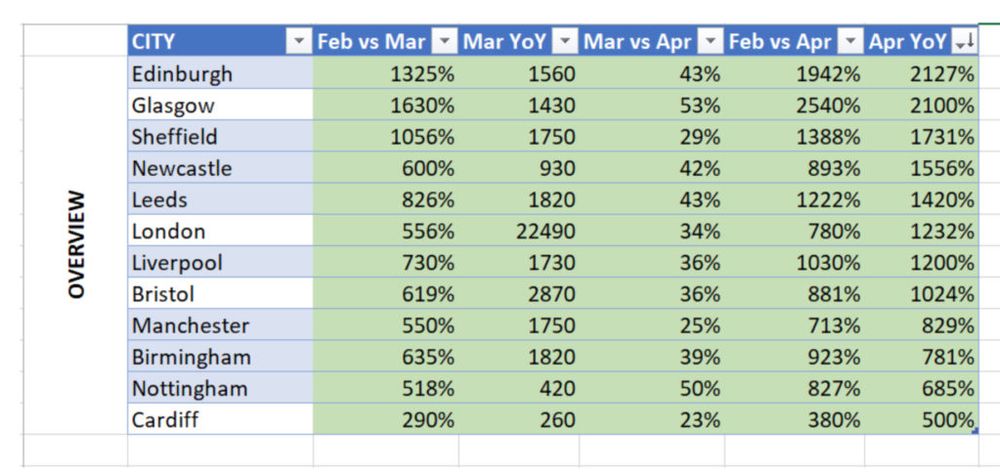
Here’s further proof of just how much demand there has been for alcohol online during the lockdown. An analysis of Google searches by Event Supplies, a party tableware supplier, has looked at the increase for terms including ‘beer delivery’, ‘cocktail delivery’ and ‘booze delivery’ and split it into main city data. It found that: – Glasgow searches rose the most between March and April – by 53%.
– Both Edinburgh and Glasgow searches increased more than 2000% year-on-year, 400% more than any other major UK city.
– ‘Cocktail delivery’ searches have increased 5,685.71% between just February and April this year.
– Takeaway beer is up 2,100% between February and April.
Airlines join retailers and restaurants in planning a new safe future

Could this be an aeroplane’s seating design in the future?
You may not want to jump on a plane any time soon – or do you? Some people are more willing to get back travelling as soon as they can. For the more cautious passenger this image might cheer you up. Airlines are working with design agencies to try and plan and re-design planes for how they can come back and be safe for crew and passengers alike. Wunderman Thompson in its latest Future 100 report says UK agency, Factorydesign has come up with what it calls the Isolate Kit, a lightweight screen that can be fixed onto the middle seat in airplanes to achieve distancing.
Then there is this above from Italian design agency, Aviointeriors proposes its Glassafe concept, a transparent hood that can be fixed onto existing seats and “reduce the probability of contamination by viruses or other.”
Plastic screens and “sneeze guards” are going to become the norm for all public places with UK retailers all fast to install them in UK supermarkets. Pubs are set to follow and in the US they are now being rolled out in major chains there like Kroger, Walmart and Whole Foods where temperature checks are the new normal for US retail,” says Wunderman Thompson.
These measures don’t go unnoticed or under appreciated with 92% of Americans said to “admire companies that are taking action to stop the spread of coronavirus, according to a study by Wunderman Thompson Data.
Latest news and views
- Gourmet Burger Kitchensays it has been able to claw back around a fifth of its normal revenue by opening up 12 of its 72 sites to do delivery, with plans to go up to around 20.
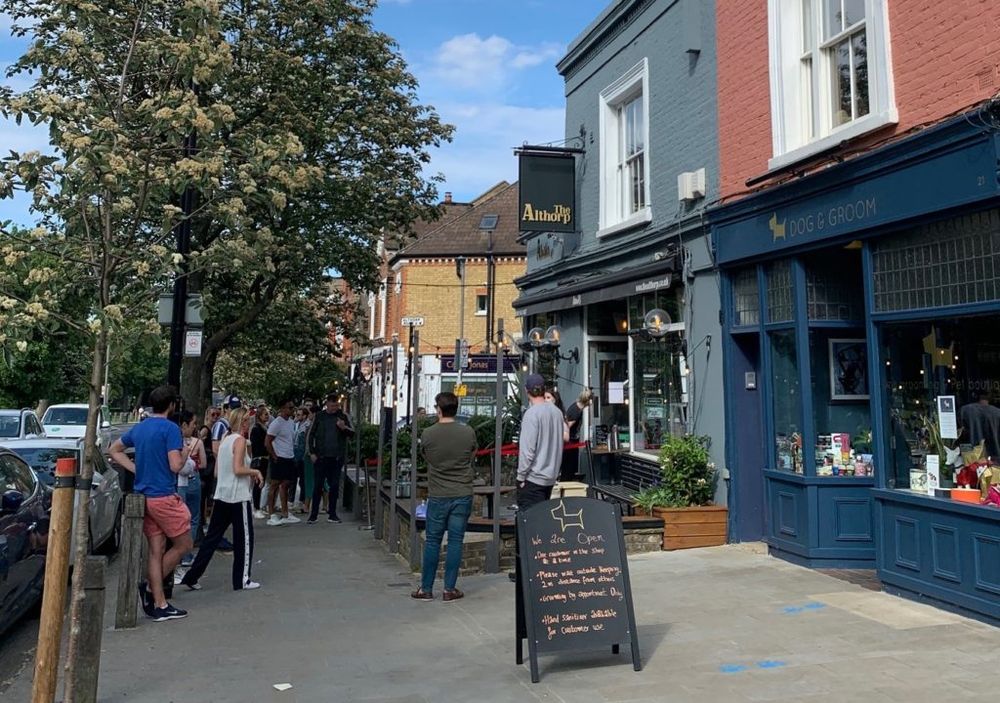
The Althorp is selling beer direct to locals opposite Wandsworth Common
- The City Pub Group is expanding its plans to open up beer gardens with cashless bars and limited menus. Its Althorp site in Battersea is already attracting people from Wandsworth Common to its outside bar as featured on The Buyer last week. It is now widening plans so that it can open as many of its 47 bars and pubs as possible when it can. Executive chairman Clive Watson told the Evening Standard it will initially do so where it can offer outside service for the safety of its staff and customers. All orders will be taken by contactless payments and there will be one collection point. It will use plastic glasses, paper plates and wooden cutlery which can be recycled. Menus will be limited to a few items of food and drink. Staff will wear gloves and masks.
- Stay In A Pub claims 80% of customers would be ‘pretty comfortable’ to return to pubs post lockdown, but this varies considerably by age group. Whilst 44% of over-65s would be ‘completely comfortable’ only 28% aged between 36-45 felt the same. Noticeably 67% of customers said they would be happy to book and pay now for an overnight stay later in the year if they could be cancelled without charge. Founder Paul Nunny says: “With the general feeling of uncertainty around when lock-down will ease and the likelihood of a ‘ultra-last minute’ demand this consumer confidence and commitment to future stays presents an opportunity for pubs to promote now through online booking offers and listings on accommodation sites.’
- Accolade Wines has introduced a new initiative in Australia – Your Venue, Our Shout – whereby it has pledged to both existing and new customers, that it will replenish all wine stock in the first month that bars and restaurants re-open up to August 31. Andrew Clarke, Accolade Wines regional managing director, says: “It has been an extremely challenging time and even though venues are beginning to re-open, there is a lot of uncertainty about the future. Your Venue, Our Shout is Accolade Wines’ way of showing support to our valued on-premise customers and lending a helping hand to get back on their feet and return to usual trading as quickly as possible.” It is also offering increased discounts on Accolade Wines’ most recent wholesale list price for the first six months after reopening, according to Winetitles Media.
May 28
Kylie celebrates birthday with launch of her own DTC Vin de France rosé

Kylie Minogue has launched her first wine today to coincide with her birthday through 450 Tesco stores but also through her own direct to consumer website
We have had a whole raft of celebrities, movie stars, sports heroes and rap artists all launch their own drinks in recent years, but few have had the excitement of hearing Kylie, yes the Australian pop princess herself, is moving into wine with her own rosé. OK perhaps just me then.
Joking aside Kylie’s arrival down the wine aisle – with the launch today in 450 Tesco stores across the country – really could be something for not just her and Benchmark Drinks that has helped develop the Vin de France rosé with her, but the category as a whole – particularly when it comes to getting people across all age groups to pick it up and give it a go.
What’s particularly interesting about this celebrity wine launch is that it is being introduced both in Tesco and through her own direct to consumer website at the same time. Now that’s star power for you. Imagine Tesco allowing any producer to sell the same wine it is retailing at £9 today to also offer the wine directly through its own DTC consumer website as well? Particularly as Kylie as so many fans who might like the idea of supporting her directly than go via Tesco.
But here it is on kylieminoguewines.com along with a gift box for £17.
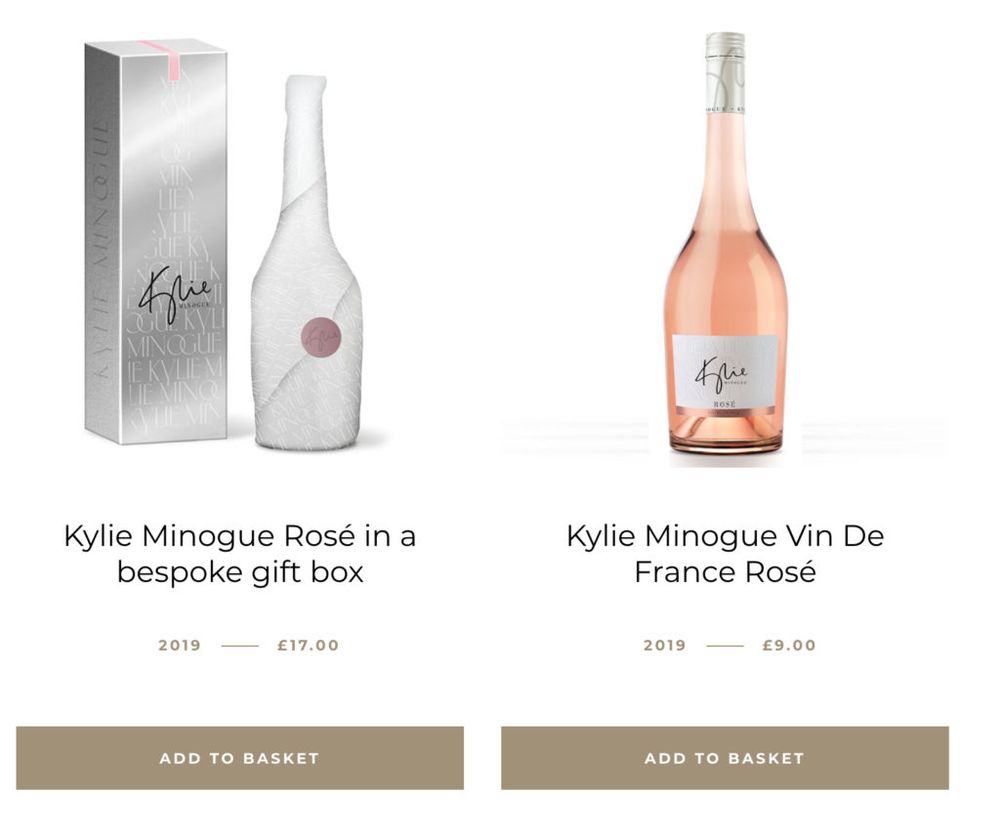
Kylie delivered direct to your door
It is the latest move we have seen right across all retail and grocery categories – from Heinz to Quaker Oats – as major household names have introduced their own DTC sites – some under the cover of Covid-19 – and you don’t get a bigger household name than Kylie.
Benchmark Drinks has also taken the opportunity to sell a wide range of its other celebrity and personality tie ins it has direct to consumer, including cricketer, Sir Ian Botham and TV chat show host, Graham Norton, US actress Sarah Jessica Parker, along with the tie up it has Argentine wine producer, Estancia Mendoza under the standalone website, winedelivered.co.uk.
Kylie’s rosé launch is the first of what is expected to be a range of wines that will be introduced by Kylie in the coming months, all aimed at bringing easy to drink, refreshing wines to her enormous fan base. Her website under “Coming Soon” promises “The Collection” which will be a range of Single Estate wines. She is billed as ‘creative director’ on the site too.
Her PR line for the new rosé – which is a blend of Carignan (80%) and Cabernet Sauvignon (20%) – might sound like something to support her latest album but having Kylie talking about wine really is something for a category in real need of some star appeal. As she says: “I have a great passion for rosé and have loved working for the last two years on developing Kylie Minogue Wines.” She says she’s pleased to have “created a rosé that I am truly enamoured by – it’s fresh, light and the perfect pink”.
Oh and did I mention it’s her birthday…?
Bibendum’s Michael Saunders on the power of relationships

Michael Saunders has relished the chance to return to Bibendum
Michael Saunders, chief executive of Bibendum, shared this comment on his Linked-in account during Mental Health Week this month in which he talks about his feelings during the lockdown and how important relationships and the ‘human’ side of the wine trade has been during this time.
Sitting in my home ‘office’, not having seen colleagues or friends (I discount zoom!) for two months now is more than frustrating. I’m a people person – I do far better when face to face. I like interaction – and much as many are lauding the advent of the communication tools we are all having to use, for me they simply do not replace the ability to connect with people in the same way. No doubt many will disagree. Perhaps it’s an age thing (me being well the wrong side of 50). But I have just launched a new team at work – from people across our business, several of whom I have never met. It’s not easy – even with everyone at our ‘meetings’ having been brilliant with their contributions. It’s just hard to get the same momentum as we would have been able to do sitting round a table – hopefully with a glass of something great.
So this really draws me to think about relationships (in the correct sense, to head off any cynical reactions!). I have been with my whole family (grown up children back at home) for all the lockdown time. Like for many I have spoken to, that has been a major plus. And an unexpected one. I never imagined I would have this opportunity in my life again once they left home. For those who I have worked with at Bibendum for a some time (both colleagues and suppliers) – it has been OK.
I have been able to navigate I hope safely so far – it’s not so easy to read reactions from a screen or written words. For my communication with many customers, the same. In fact it has been great to feel that as we are face into broadly similar issues, we have been able to share pain and really get into how we can best help each other.
But the reverse is also seemingly true. When I know people less well – it has been harder. And felt at times more guarded, even formal, than it would be if we could see each other. That hasn’t necessarily been bad, but can leave me wondering what nuances I may have missed.
We are in Mental Health week – which drove these thoughts. I really feel for those who don’t have the luxury of the great support that I do – from family, friends and colleagues. It must be incredibly lonely and tough. And I know this, given the privilege I have of chairing The Drinks Trust – and hearing from Ross [Carter] and the team there about the cries for help from so many, with some cases really terrible situations, truly underlines how lucky I am. And how badly the charity is needed. I believe our industry understands this, demonstrated by the incredible fundraising for The Drinks Trust (please don’t stop – I worry about momentum slowing).
There is real power in relationships. For life, personal and business. For happiness. And a huge sense of belonging. The lesson to myself: take none for granted, of which I have certainly been guilty, even in the recent past..
Chart of the Day: Kantar analysis of new shoppers driving key category growth (supplied by Quintessential Brands)
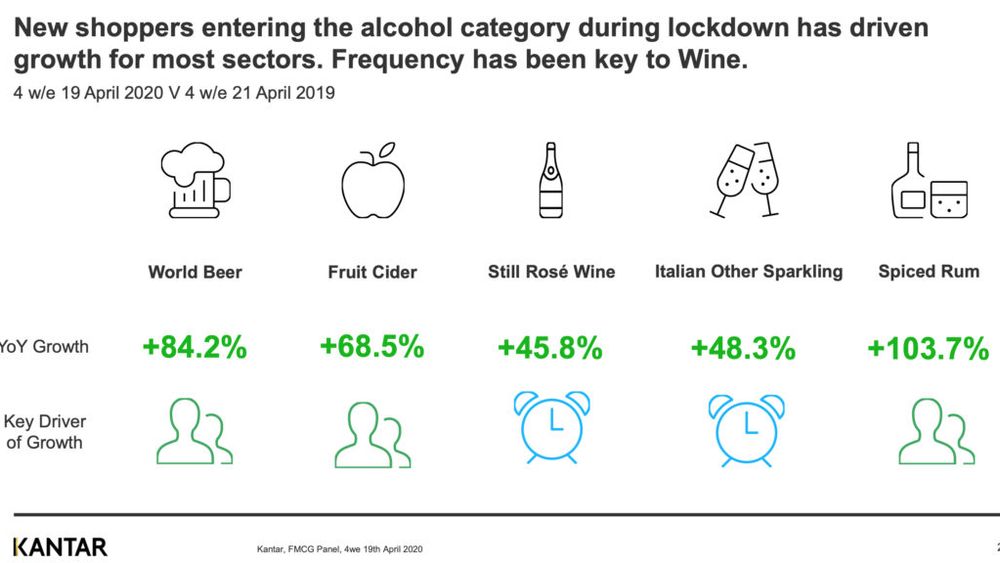
Amathus Drinks hopes its laid back but informative home tastings are here to stay
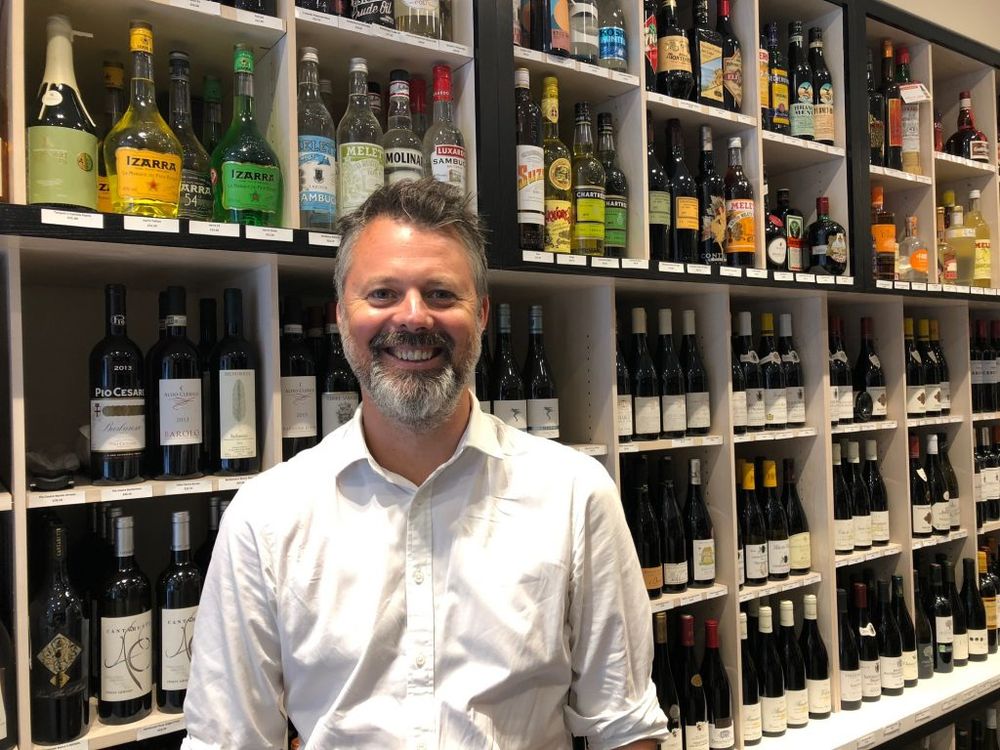
Jeremy Lithgow MW hopes his fun but informative tastings can help bring fresh live to his wines with customers during online tastings.
Amathus Drinks, the wine and spirits retailer and importer is running a series of interactive online tastings, with what it is calling its “Taste Together”. So far the tastings have been to help promote and talk about some of its key wines, but it is now to be expanded to cover spirits and include some cocktail demonstrations as well. Which will give the chance to some of the Amathus team to show off their mixology skills alongside some of the brand ambassadors from the major spirits brands involved.
The idea is to allow customers to buy a selection of bottles or samples for delivery or collection, and then get a code to take part in the 45 minute-1hr tastings. during which they can taste along and post live feedback and questions. The tastings can be purchased from www.amathusdrinks.com
Jeremy Lithgow MW, Amathus Drinks’ head of wine, says: “There’s a world of wine and spirits out there which people might not have tried or even considered before, so we see this as a fantastic opportunity for people to expand their palates and delve into some of the less obvious corners of the categories.” Amathus also hopes to introduce different styles and themes with tastings to come including Hungarian Tokaji, a red wine from the Azores and a late-harvest Australian Muscat.
We have occasional guests dipping in to present their own wines, and we’ll be linking up with producers to host entire tastings direct from their wineries and distilleries,” he adds. .It’s great to see that some of our regular clients have really embraced the tastings with meals designed around the wines on the night, and we’ve seen disparate groups of friends using this as a springboard into a full evening of online socialising once the tasting has finished.”
It seems the “informative yet accessible” style is working well with Amathus customers. “We want people to come away feeling they’ve learnt something new but most importantly enjoyed a few delicious glasses in the company of like-minded people!” says Lithgow.
- To catch up with all the other insights, data, trends and what the drinks and hospitality sectors has been up to in May then click on Covid-19 Hub Part 3 here.
































